Probiotics: Should Your Baby Be Taking Probiotics? with James Marin, RD, EN and Dahlia Marin, RDN, LD
- Your baby's sterile gut environment and how environmental and dietary factors can contribute to both a healthy and unhealthy gut environment
- Being a plant-based family and raising their daughter 100% plant-based. Dahlia shares about her own upbringing in a family that celebrated the “clean plate club” and how she's reframing a healthy relationship with food for her own daughter
- Working together in nutrition practice as a married couple and how James and Dahlia deal with requests from parents about supplements for gut issues that can be solved with a food-first approach
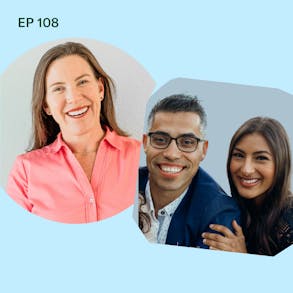
LISTEN TO THIS EPISODE
Episode Description
What’s up with your baby’s gut? Do babies need probiotics to help make their belly health better? In this episode I’m joined by James Marin, RD, EN and Dahlia Marin, RDN, LD of @marriedtohealth. They’re a plant-based dietitian team who help parents and clients with their unique approach to integrative medicine.
In this episode we’re chatting about your baby’s microbiome (...and also your gut health!) How can foods provide the probiotic bacteria a healthy gut needs, and what foods babies can eat to make this happen. James & Dahlia also speak about what supplements babies should (and should not) take as well as their evolution to a 100% plant based diet for their family and how that worked when they were doing baby-led weaning.
About the Guest
- Dahlia Marin, RDN, LD and James Marin, RD, EN are authors, speaker, and private practice owners of "Married to Health"; an integrative dietetics practice and team that takes a gut-centered approach to reversing symptoms of various chronic diseases.
- Dahlia Marin, RDN, LD, CGN and James Marin, RD, EN are the co-founders of the integrative dietetics practice Married to Health and the first 100% plant-based SIBO/IBS nutrition program.
- As gut health dietitians, Dahlia and James’ goal is to spread knowledge about the importance of incorporating plant-foods to support a healthy gut microbiome (#goodgut) and help those with gut issues get back to a thriving gut microbiome.
Links from this Episode
- James & Dahlia’s website MARRIED TO HEALTH is here
- Follow @marriedothealth on Instagram here
- Baby-Led Weaning with Katie Ferraro program with the 100 First Foods™ Daily Meal Plan, join here: https://babyledweaning.co/program
- Baby-Led Weaning for Beginners free online workshop with 100 First Foods™ list to all attendees, register here: https://babyledweaning.co/baby-led-weaning-for-beginners

Latest Episodes
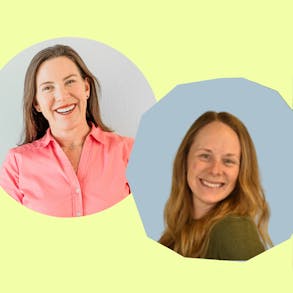
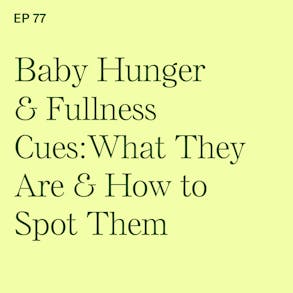
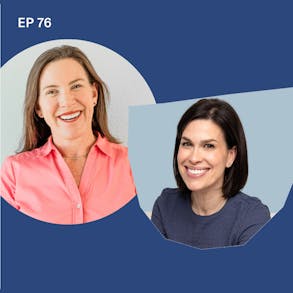
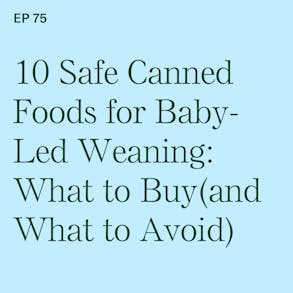
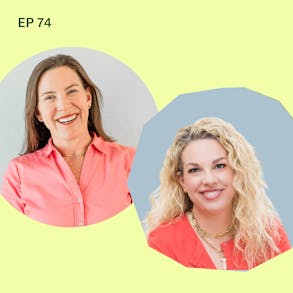
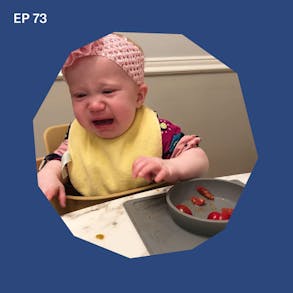
Dahlia Marin (1s):
So it is very hard to standardize that amount of probiotic, those strains of probiotic, because we all have different predispositions to different things. And again, just trying to throw probiotics at something might not solve the issues.
Katie Ferraro (14s):
Hey there, I'm Katie Ferraro, Registered Dietitian, college nutrition professor, and mama of seven specializing in baby led weaning. Here on the Baby-Led Weaning Made Easy podcast I help you strip out all of the noise and nonsense about feeding, leaving you with the competence and knowledge you need to give your baby a safe start to solid foods using baby led weaning. Hey guys, welcome back. It's national nutrition month and all month on the podcast. I'm interviewing other registered dieticians, working in the areas of food and feeding and nutrition and today's dietician.
Katie Ferraro (54s):
It's not just one dietician. This is a married couple of two dieticians. That's right. Dahlia and James Marin are joining me today. They're the team otherwise known as Married to Health. Dahlia is a plant-based registered dietician nutritionist. She has a background in gut health and she works along with her husband, James in a private practice. They're located in Laguna Niguel in Southern California. James is also a dietician, pretty rare, not a lot of guy dieticians to begin with and not a lot of guy dieticians married to another dietician. So this is cool. James, an integrative registered dietician. He's also an environmental nutritionist. They both specialize in using whole plant foods as a form of medical nutrition therapy.
Katie Ferraro (1m 35s):
And so they're on the podcast today. We're actually going to be talking about gut health and in particular probiotics because James and Dahlia worked together in a private practice. They actually provide virtual nutrition counseling to their patients for a lot of conditions focused on and centered around gut health, intestinal health. They're going to talk a lot about the microbiome, but we're going to speak specifically about probiotics for babies. Should your baby be taking probiotics? So with no further ado, I want to introduce you to the fabulous dietician team, James and Dahlia Marin talking about probiotics. And should your baby be taking probiotics? Well, hi James and Dahlia. Thank you so much for joining me on the podcast. I am so excited to get to interview both of you together.
James Marin (2m 16s):
Yes.
Dahlia Marin (2m 17s):
And thank you so much for having us Katie. We're so excited.
Katie Ferraro (2m 20s):
I just have to say right off of the bat, like I so admire that you guys can work together. I, I like can't even stand like doing like bills with my husband. I don't know how you guys manage, you know, running a practice together. You're both registered dieticians. I don't know if I've ever met a married dietician. Couple of my, my own mom is a dietician, which is how I actually got interested in the field. And that's like a close enough relationship for me. So could you just tell us a little bit about your background? How did you get to where you are? How did you come to work together and both be dieticians? It's such a cool story.
James Marin (2m 52s):
Yeah, its great. I'll let my wife go first. She's great at telling the story.
Katie Ferraro (2m 56s):
That's the right answer, correct.
Dahlia Marin (2m 57s):
He's smart. That's how we work together, after 12 years he's learned. So, you know, my journey began where I was an unhealthy child. I grew up first-generation American, very acculturated diet that led me eventually to simultaneously being diagnosed as a teenager with obesity, pre-diabetes hyperlipidemia, polycystic ovarian syndrome and an autoimmune thyroid condition. So my journey to nutrition really started with myself. I just started researching the topic because I knew that having a pharmacy to take everyday was not the destiny I wanted for myself. I looked around me. I saw others in my family and others who I knew doing that, and I just didn't want it for myself.
Dahlia Marin (3m 39s):
So I started looking into nutrition and started improving my own eating habits. I ended up taking a nutrition course at a community college. At that time, I was a psychology major in college and I just fell in love with it. So I decided I'm going to switch. I want to pursue dietetics, nutrition and dietetics. And it's funny because the same college, I ended up transferring to where James and I met. I initially got accepted to that college. I decided not to go there. So I ended up having to take an extra year to graduate, but on my very first day of college, I met James.
James Marin (4m 11s):
Yes and same, I grew up very unhealthy. I was I'm third generation here in Delhi as Egypt and I'm Hispanic and a, you know, third generation here. So I grew up on a heavy load of pop tarts and sugary cereal. And my mother didn't breastfeed me. And I was, I remember drinking the pink antibiotics, like almost every month, cause it had something wrong with me. So I was what I would consider a typical American. Right? And so with that, as I got older, I was morbidly obese in elementary school and junior high, I had joint pain. I had asthma. And I was like, there has to be like, I started feeling like, what is wrong with me? And I started exercising and I'm like, oh, exercise. That makes me feel better.
James Marin (4m 51s):
And through that, I started getting into sports. I played football and towards the end of high school going into college, I was like, I need to, I love this. I want to do this for my life. I want to become a nutritionist. Or, and then I found out about a registered dietician, transferred to Cal Poly and then met Dahlia. So we were both kind of on our health journeys. And then we met together and continued it.
Katie Ferraro (5m 13s):
This is so cool. Like I have to have you guys on because your focus is a little bit different. You have a holistic nutrition practice, which to be honest, isn't a lot of time associated with dieticians. They have the kind of reputation of being the food police in there in the hospitals with the white coats, delivering you jello and telling you what not to eat. And I think that that's a really outdated stereotype of dieticians and you guys are the embodiment of where the field and the profession is going. So could you share a little bit about what you do in your professional practice now together and then how you got there? Cause I'm sure you didn't just start a private practice right out of your internship, although you could, if you wanted to, because you are the experts in nutrition.
Dahlia Marin (5m 46s):
No, this was always a vision. James and I talked about. We always knew we were different even while going to school, even while completing our undergrad in higher education, we were different. So we knew that we wanted to do things differently. I had a hospital job initially, James worked in public health initially and we just saw all the red tape that was involved with that. We saw the things that we loved and maybe didn't love. So we wanted to take all the things that we did love and elevate them and make something that was really unique and really great in our opinion. And if we had to kind of explain the way that we practice it, a baby, that Western medicine and Eastern medicine has, there's so much value in both ends of that spectrum. And I think oftentimes you find dieticians or even other health professionals at the polar opposite ends.
Dahlia Marin (6m 31s):
So we said, we see both, both are great when they're warranted. So we want to integrate both appropriately with one another and we live that way and we want to deliver that to others. We want to live that way as well. A
James Marin (6m 42s):
And really, it was like, you know, I'm sure a lot of listeners and everyone can relate to like information overload. Like you're hearing it from social media and TikToK and YouTube and all these books and professors. And so, you know, it was really like, how do we curate this, right? How do we take everything we've been learning over the last seven plus years, eight years now as dieticians and like distill it and curated it and really take the best of everything. And that's what we put into our practice was like the best of the east, the best of the west holistic, functional integrative, you know, environment and putting it all together into like, here's the big picture for your health and nutrition.
Dahlia Marin (7m 16s):
And that's why we called ourselves married to help. Not only are we married to each other, we do kind of marry these different concepts.
Katie Ferraro (7m 21s):
For those of you listening. If you're not watching video version of this, they have these beautiful pictures of the human gut behind their heads. I love it. It's like, I know your specialty is gut stuff. And that's like, what? We're here to talk about specifically today. Maybe you could just share a little bit about the link between the gut and the brain. First of all, for all of us parents, like we sometimes forget, I always think like the butterflies in your stomach is the perfect example. Like you're nervous and it's affecting you physiologically in your gut. How is the gut in the brain linked? And then maybe in a second, we can kind of segue into how that affects your baby.
Dahlia Marin (7m 52s):
I love that question. I think it's so important to discuss that. And I think a lot of times it doesn't get talked about and now more and more, we are starting to hear about it. We have something called the interior nervous system in and around our gut. And so the gut and the brain connect directly between something called the vagus nerve. We know that there are so many nervous signals going from gut to brain. And then some coming from brain to gut. We have seen in studies that we produce upwards of 70% of our serotonin in our gut. We also produce over 50% of our dopamine in our gut. These are happy chemicals. They come directly from our healthy gut, what we eat and what interacts in our gut microbiome directly affects our mood, our behavior.
Katie Ferraro (8m 36s):
So when parents ask specifically about their baby's gut health, and sometimes I'll get questions about, and I have a very food forward approach and I personally work with like a primarily neuro-typical population. So completely understanding that with diagnosed no vitamin and mineral, nutrient deficiencies there's needs for supplementation. But when parents start asking questions about, I was curious what they say, like, what supplements should my baby be on for probiotics and gut health in babies? Is there an indication for supplements or can we find food-based ways to help babies in this arena as well?
Dahlia Marin (9m 9s):
That's a really great question. And we received that question as well. I think it's very easy to ask, what supplement should I be giving or what supplement should I take? And I like people to think even before that, what we do know is our microbiomes look 100% different now than they did even a hundred years ago. And this is oftentimes in regards to babies in the baby's gut due to very sterilized conditions. This can happen when mom might have taken antibiotics during pregnancy and whether she's group B strep positive or for other indications, maybe mom needed to take antibiotics. So that wiped up. Some of her bacteria, perhaps mom had a C-section and not vaginal delivery. We know that that vaginal microbiome, inoculates baby, initially, with some important microbes and now things are changing, thankfully for C-section deliveries, where babies are getting swapped with mom's vaginal bacteria, even if they are delivered C-section.
Dahlia Marin (10m 2s):
But if it's that sterile condition, maybe mom wasn't able to breastfeed. So in that case, if baby is missing all of those touch points, when perhaps natural microbiome could have been delivered to baby, possibly.
Katie Ferraro (10m 17s):
So if it is a baby, like I said, who was on that trajectory? Mom took antibiotics, C-section delivery, not breastfed. They might be missing a lot of a very important strain. If that strain is possibly at risk, then yes, perhaps one can benefit from either supplementing baby or supplementing mom with that specific strain. But there have been other studies where other strains were utilized. No benefit to baby more than one week after supplementation, even if mom continued to supplement baby for months. And then again, long-term effects. Studies had no benefit from using other strains of probiotic. Our gut is very complex in an infant microbiome. There are dozens, hundreds, thousands of strains or any forming.
Katie Ferraro (10m 59s):
So usually in most probiotic supplements, you're getting four strains, five strains, and a lot of them that might set off the natural rhythm and that natural balance.
James Marin (11m 9s):
And so, right. And so the analogy here is, is when it comes to your gut microbiome, you are building structure and you're building population, which in turn equals function. Right? And so a great analogy is like New York city wasn't built in a couple of weeks, right? Like you had to build all that infrastructure. And we like all these businesses and then all these people moved in and now you have a thriving population. So it would be like when you're overloading the body with probiotic supplements, you're taking a small city in Ohio, let's say, and trying to make them New York city. And what if you took all the people in New York city and moved them to that small city in Ohio probably wouldn't work out long-term right. So that kind of, that's kind of that analogy, which links back to that it's one week it shows a difference because maybe those people were there for a week and soon they were like, I don't have a place sleep or live.
James Marin (11m 54s):
I don't have a job I'm getting out of here. Right. So then the name of the game is how do we build that structure? How do we build that gut microbiome? And really it comes down to breastfeeding.
Katie Ferraro (12m 5s):
And let's talk about the food-based sources of probiotics, because I think when people hear probiotics, they automatically think supplements and is important to remind people that there's not even consensus in the healthcare and the research community about what dose constitutes an effective amount of probiotics. As I understand it, or what are the best strains? Like, it's not like you just say probiotics and you take X amount like iron, you need X number of milligrams a day. It doesn't work like that with probiotics. Is that correct?
James Marin (12m 31s):
Correct.
Dahlia Marin (12m 31s):
That's very correct. And again, I think an analogy James likes to give us, you know, we all have fingerprints, but we're all unique. So our microbiomes are very, very much the same. So it is very hard to standardize that amount of probiotic, those strains of probiotic, because we all have different predispositions to different things. And again, just trying to throw probiotics at something might not solve the issue. So as much as we want to focus on prevention, we can also focus on diet, which is also another initiative with prevention. So mom's diet can be very rich in prebiotics as well. So different types of plant foods. And that's really where the prebiotics come from. They come exclusively from these fiber, rich fruits, vegetables, nuts being seeds, grains legumes.
Dahlia Marin (13m 16s):
So if mom's diet is very rich in that, then her breast milk will also be very rich in that as well. We also know that there are foods that can, can change strains of probiotics. I think most of them are referred to us ferments. So we think that when we ferment certain types of foods, that they produce live strains of bacteria, and it can vary from different things, but things that are fermented and probiotics can be kimchi sauerkraut. It can be things like Kiefer, or it can be yogurt. They could also be a dairy free yogurt as well, made of different nuts or seeds like almond cashew or appealing. These usually have added strains of probiotic in them. And studies have shown that mom can pass those probiotic strains onto baby.
Dahlia Marin (13m 60s):
And those are present in her breast milk. If mom is consuming some of these probiotic or fermented foods that are supposed to improve,
James Marin (14m 7s):
I kind of laugh at this topic because there's really even no consensus on what a probiotic is like the term probiotic. Right. And so...
Katie Ferraro (14m 14s):
I laugh at the topic, which is why I asked you guys to be on the podcast. I'm like, maybe they understand it, but it's all seems like a little bit of like lotions and potions, these sort of stuff like,
James Marin (14m 22s):
Right.
Katie Ferraro (14m 23s):
Right. Because even, I mean, what, how much what's a billion well, is it 10 billion or which strain or, and also like isn't yogurt, just like in and of itself, a natural source of bacteria and probiotics. That's good for the gut. And if you give your baby whole milk, full-fat unsweetened yogurt, like, boom, there's a probiotic food. Why do you have to go buy a fancy supplement? It's kind of always been my approach, but I just wanted to get yours.
James Marin (14m 44s):
Yeah, no, no, seriously. I mean, it's, it's crazy because we'll go to these expo sometimes for our profession. I don't know if you've been to natural products expo and there's probiotic, chips and probiotics, soda and probiotic, even probably there's a lotion, a probiotic, a lotion you can rub on your face, right? So there's probiotic everything. But really when you are, let's say getting cabbage and throwing it in vinegar with a little bit of salt and water and you're watching it ferment, where did that stream come from? We didn't buy it and add it to that jar of cabbage. The strains were ready on the cabbage, right? The idea is that you're eating tons of these microbes. And if you can eat what we find and what we find in studies, which is a majority of a plant foods.
James Marin (15m 24s):
So potatoes, and like I said, beans and fruits and vegetables, you are getting this variety of microbes. And hopefully they're going to have the synergistic effect. That's hopefully going to be positive. So that's a simbyotic effect, right? Rather than, you know, coating a chip in a probiotic capsule saying here's a probiotic chip who knows, you know, so are taking out a bunch of supplements.
Katie Ferraro (15m 46s):
It's like organic junk food is still junk food and people, cause you had said the perception of health, which is, you know, it's 99% marketing, just like so many things in the baby food world. Like these are all things for the most part we don't need. And that's why I was so excited. It's hard to find a gut health expert to come on and talk. Who's not going to try to sell you a million supplements. And like, and yet that would be, you know, the golden pills, what everyone wants. It's a little bit harder to work on introducing foods, but we have a whole audience of parents are like, no, I want to do this. I want to introduce these foods to my baby. So without freaking out about your baby's gut health, but like for your again, neuro-typical child, mom maybe fed colostrum, but didn't exclusively breastfeed has a decent ish diet. Like is your baby's gut health. Something like if you had to rank and prioritize things to freak out and be worried about like, is that high up there?
Katie Ferraro (16m 29s):
Or is this something that I think we maybe are, the idea is pushed upon us by the supplement industry that like, oh, we need to be so concerned about it. When maybe if we just worked on feeding our babies real foods, their gut microbiome would develop the way it's supposed to. Not to put any words in your mouth. That's just my opinion. I'm like, am I on track here? Or like...
Dahlia Marin (16m 46s):
You are absolutely. Especially when it comes to probiotics for the gut supplements should be conservative more is definitely not always better. So we know that when you're taking people are usually attracted to them, my patients are always like, oh yeah, I'm taking 10 billion colony forming units of this, these two strains. We use thousands of strains in your gut. So you might actually be offsetting things and you can do the same for your kids. So if they're unnecessarily being given probiotic supplements, you could very well be suppressing the development of some other strengths that they need to be making because you're overwhelming their microbiome with these probiotics food first is always going to be an approach. And like you said, that mom, that example that you gave, maybe she fed some cluster and breastfed for a little bit.
Dahlia Marin (17m 30s):
Diet is decent. They're doing great. They have no concerns of giving probiotics. And we know last year the American Gastroenterological Association came out with their guidelines and they even showed for the general population, adults and children, really, most people should not be taking probiotics. Very few cases, a typical mom with a typical diet and a little bit of breast milk, you should be good. .
Katie Ferraro (17m 55s):
What about prolonged antibiotic use in children? Like if your child has had multiple ear infections, I know sometimes parents are worried, oh my gosh, because you know, antibiotics, not only kill the bad stuff, but they kill some of the good guys too. If you have had a medically fragile child or a child who has been on antibiotics for whatever reason for prolonged period, would that be a reason to possibly consider needing additional probiotics? Yes or no?
James Marin (18m 16s):
You can tell, let me just as a disclaimer, this is not medical advice and we are registered dieticians, but go ahead.
Dahlia Marin (18m 23s):
That's a really, really good question. And before we get there, I like to always give the context of they've done analysis and have shown that over 50% of antibiotics given are given unnecessarily. So oftentimes of course, most parents know that. I think, yeah, we jump on things that maybe aren't even bacterial. So one make sure that it is warranted. And two, they actually, a couple of years ago, I think it was a 2017, 2018 study that took three groups of people. And with all three groups of people, they administered antibiotics. So they wiped out their microbiome. And one of the groups of people, they had first taken a fecal microbiota transplant from the own person.
Dahlia Marin (19m 3s):
So they had a sample of their stool for the second group. They gave them probiotics after taking antibiotics and for the third group, they did nothing. What they found that after three months of this study was of course the group that recovered their original microbiome most quickly was the one that got their own FMT. They literally got one microbiome given back to them. The group that recovered second was not the probiotic group. It was a group that did nothing. They even found that at the end of this three month study, the probiotic group had not recovered their original microbiome eat that much healthier after you've taken antibiotics, try to recoup your own natural microbiome with prebiotic foods. And you can eat some of these fermented foods that hopefully have probiotic strains in them.
James Marin (19m 47s):
And I always like to, I mean, our approach is why, why were those, you know, chronic ear infections happening? Why, what else was happening? And usually when we probe and ask these questions, it's really, you know, we're so go, go, go. And, you know, as, as a parent and we know as parents that like, oh my gosh, did they have to go to tumbling? And then they have karate and they have school in this project and we have work and it's go, go, go. And you really don't stop to think of, oh, wow. Yeah, that did happen. Where before they got an ear infection, you know, they were actually on antibiotics, not that long ago for something else or, you know, we just follow the rabbit hole down and we try to get to that route and we try and go, oh, look, let's focus. And let's double down on the lifestyle in this area. Let's really like Dahlia was saying, add back these foods.
James Marin (20m 28s):
Or maybe there's some emotional trauma or there's stress or there's anxiety. There's other, you need more sleep. You're not hydrating enough. There's, it's usually a multifactorial, you know, solution to this multifactorial problem.
Katie Ferraro (20m 41s):
It's not just take a supplement
James Marin (20m 43s):
Or take a supplement or take an antibiotic. And there you go. You're going to be all set. It's usually not that
Katie Ferraro (20m 49s):
I love to ask guests just a little bit about the way they introduce solids to their babies. So I was curious for your guys' daughter, just for our audience, they love to know where you're coming from. I know you guys are a primarily plant-based family. Did you raise your daughter that way? Did you guys do baby led weaning? Does she eat the same as you like, what's your family approach for feeding?
James Marin (21m 8s):
Yeah, so she is, so our daughter has been a hundred percent. Plant-based her whole life. And this was, you know, it's, it's a cool experiment. We did it and it's worked out. And so Dahlia and I have been a hundred percent plants.
Katie Ferraro (21m 18s):
You're lucky you sounds kind of like, oh, that's fair. But to get my kids in diner. I'm kidding. I'm kidding.
James Marin (21m 23s):
It is, I mean, it's, it's really cool. Like sciences, when you're looking at science, even peer reviewed studies, like you're going off educated guesses, right? Like this is out of all the factors of knowledge we have or doing experiments and saying, okay, this looks like the best path who knows it might not be, but we're going down that. And it's been working out really well. Dalhia and I are going on 10 years, a hundred percent plant-based and it's been really great.
Katie Ferraro (21m 46s):
Does that mean vegan? I'm sorry. I don't know the terminology, but they're both smiling.
James Marin (21m 50s):
No, that's fine. I mean, and that's why we have nothing against a majority of our patients eat animals. And we, you know, we say as long as you're a majority, plant-based we feel like that's more of us need more plants, essentially. We're not really vegan. Vegan is more of a lifestyle and a belief system of like do no harm to animals. Not that we go out and harm animals, but you know, we're, we're in it more for health, not for like ethical reasons. We're not ethical vegans who are more of just healthy vegans.
Dahlia Marin (22m 16s):
So health and the environment.
Katie Ferraro (22m 18s):
Yeah. So you guys did not do fish, shellfish, eggs, dairy, like you just, you just don't do those foods. You, you made the conscientious decision to not do those foods for your family.
Dahlia Marin (22m 27s):
Yes, so we modified baby led weaning in the sense that it worked for our family and our lifestyle. And we introduced the other allergens that are, plant-based like peanuts, tree nuts, coconut. So we have introduced her to those plant-based allergens and it has come up. So Layla recently has taken an interest in eggs. She in preschool would see that for snack time. Sometimes the kids would eat hard-boiled eggs and she was one day came home and she said, I want to try it. And again, we are not ethical vegans per se. And so I kind of talked it out with James and we openly have family discussions and I was like, okay, interesting. Why do you want to try eggs Layla? Well, I don't know.
Dahlia Marin (23m 7s):
They just look interesting. My kids in my class were eating it. I'm kind of curious about it. So we were like, okay, well, let's talk about why we don't eat eggs because she did ask, she said, if I try them, will you try them with me? And I said, you can try them. I respect you. And I want you to be able to try things if you want to try them. And I want to make sure that their responsibility stores, James, his uncle has backyard chicken. So we said, okay, maybe when we see uncle Paul, we can try one of his eggs, but she asked if I would try an egg with her. And I said, I personally would not want to eat the egg because of X, Y, and Z, my personal reasons for not wanting to eat eggs, but you can try them. And so I said, think about it. You know, we're going to see uncle Paul.
Dahlia Marin (23m 48s):
And so she came back and she was like, I don't think I want to try it, but I might. And I said, okay, I kind of left it at that. So we'll see how that goes and introducing that to her, because that will be one of her first exposures to that. I'm sure in her six years of life she's been exposed somewhere, a baked goods she's had well with my mom or, you know, I'm sure these things have come into her diet one way or another, but that will be, you know, if she so chooses, which we don't know if she will, her first exposure to that food.
Katie Ferraro (24m 16s):
So do your parents support a plant-based lifestyle because you've both shared openly that you were raised in families that didn't have the same emphasis on health and nutrition that you two have now not only made part of your marriage, a part of your business and now your daughter's life. How do you deal with the interaction with family members who might not understand or be pressuring you to make Layla try an egg from your uncle's backyard?
James Marin (24m 39s):
Yeah, I'll say my family has a harder time with it. Definitely. Then Dahlia's family. And I think it has something to do with culture. I think I'll let her speak to that, but my family has had a really hard time with it and yeah, we've had to set boundaries and really, it's just kind of like, this is our boundary. Please respect us. And, and yeah, just been really adamant about that. But I think when people kind of see where we're coming from, they see what we do. We have the talking points to back it up. Like if my family tries to challenge me, I'm like, here's ABCD you know, and they're like, okay, nevermind, like I'll back off.
Dahlia Marin (25m 11s):
But yeah, and with my family, really, it's not only the fact that we are plant-based, it's also just the fact that we've taught Laila, intuitive eating. We do practice, you know, the division of responsibility with her. We do teach her that when she's satisfied and she's in charge of telling us that, and that was very new for my family. I was a member of the clean plate club. So initially with my family, that was probably the harder thing for them of saying Laila, finish your plate and you know,
James Marin (25m 39s):
Just take one more bite. And it's like, why? She said she's satisfied. Right? So yeah.
Dahlia Marin (25m 43s):
So both of them kind of happened, I think simultaneously, which kind of just let my family know, look, we know what we're doing. And we feel very passionately about that. And we would really appreciate if you respected us and this is what we want for our daughter. And, but with both, they really have opened up. I remember when I was pregnant, my mom laughed and she was like, ah, with her addiction actually saying she's going to be vegan. And I said, yes, you know, right now that's how I would like to raise my daughter. And so over time, they've really seen that we are passionate about this. And now my mom is even the one telling my dad. I heard very recently, my dad was telling Layla to finish her plate. And my mom said, no, no, they don't do this. My mom told him like do that.
Dahlia Marin (26m 24s):
Like, so I think in every aspect, it has been a learning experience for us and for them. And now Layla is her own little advocate. She tells me, my mom laughs and tells me if you know, in the past, when they took her to restaurants, Layla will ask even starting at three years old, she'll ask the server. Does this have meat, is this vegan? So she of will ask on her own, if it does meet the way that our family chooses to eat.
Katie Ferraro (26m 48s):
Layla is lucky ecause you guys are both on the same page about that. Like for many families even starts with the parents are not on the same page where one parent or partner will be pushing the baby that she needs to be eating more because they're not getting enough. The other one's like, no, it's actually, I love what your mom said. It's not what they do anymore. Like literally that's not a thing anymore. So, and it's okay to have those discussions, but it does help when both parents are united on the same front. So I am like totally in awe of you guys. I think the work you do is so important. I think it's so important that you're helping to promote the face of nutrition and dietetics with cultural diversity, with different foods, with different areas of nutrition, environmental nutrition for James and doing all of the integrative work that you're doing Dahlia it's really, really inspiring.
Katie Ferraro (27m 32s):
So thank you for the work you guys do. And I was curious if you could just share with our audience, where can they go to learn more about both of you and your practice and all of your resources?
James Marin (27m 40s):
Yeah. Our website marriedtohealth.com. You can find us on Instagram @marriedtohealth and everywhere. Facebook, YouTube, all married to health, even TikToK, even clubhouse. Clubhouse is a new one. We're interested on that.
Katie Ferraro (27m 54s):
Thanks guys. Oh my gosh. That was awesome. You guys are amazing.
James and Dahlia Marin (27m 57s):
Thank you so much.
Katie Ferraro (27m 58s):
Oh my gosh. How cool are they? Could you imagine working with your husband that closely? I love them and they're like so nice and smiling. I also wanted to point out like, it's really hard to people. Come on and talk about gut health. You guys, this is not like the most interesting thing. Well, I said they're the first people I've ever talked to about gut health, where I haven't fallen asleep because they make it interesting. But they're also not like too super over your head. Like what's the takeaway message. So I think what a fabulous couple James and Dahlia Marin they're out of Southern California, they're actually in orange county, marriedtohealth.com and I'm going to link up all of their resources on the show notes for this episode, that's at blwpodcast.com/108. Thanks for listening and happy national nutrition month.

The Program Baby-Led Weaning with Katie Ferraro
A step-by-step digital program for starting solid foods safely and navigating the original 100 FIRST FOODS™ meal plan with baby-led weaning.
 EXPERT-LED, PROVEN APPROACH TO EATING REAL FOOD
EXPERT-LED, PROVEN APPROACH TO EATING REAL FOOD CONCISE VIDEO TRAININGS TO MASTER BABY-LED WEANING
CONCISE VIDEO TRAININGS TO MASTER BABY-LED WEANING 100 FIRST FOODS DAILY MEAL PLAN WITH FOOD PREP VIDEOS
100 FIRST FOODS DAILY MEAL PLAN WITH FOOD PREP VIDEOS
Baby-Led Weaning for Beginners Free Workshop
Is your baby ready to start solid foods, but you’re not sure where to start? Get ready to give your baby a solid foundation to a lifetime of loving real food…even if you’re feeling overwhelmed or confused about this next stage of infant feeding.
Get baby-led weaning recipes and tips delivered to your email inbox.

